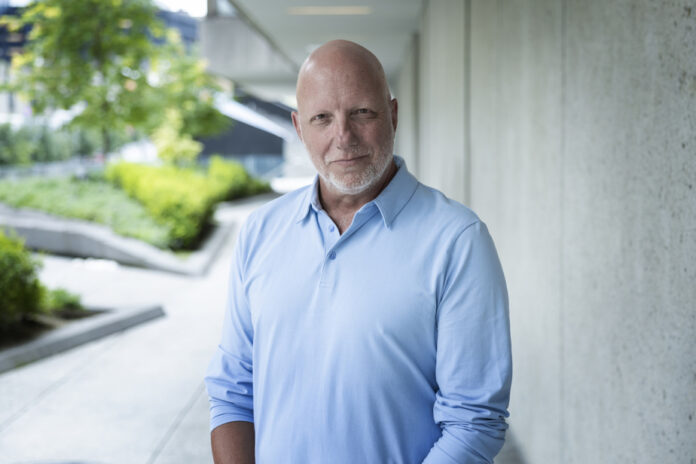It’s been more than 40 years since Denis Bernard graduated from the Conservatoire d’Art Dramatique de Québec. Since then, her career has blossomed, life has blown her strong winds and headwinds, but her love of theater has never waned.
In fact, the actor from Lac-Etchemin considers the theater – the art, but also the physical place, with its stage and its rehearsal rooms – as his second home. And despite his 65 years which could make him want to consider a deserved retirement, he has no intention of stopping.
It is therefore with sincere joy that he returns to the stage of the Duceppe theatre, where his Montreal career began in 1985, when he played the role of Ében Cabot in Désirs sous les ormes by Eugene O’Neill. . This time he wears the clothes of Howard Beale, the central character of the play Newsroom, inspired by the film Network by Sidney Lumet.
“I saw the movie when it came out in 1976 and I remember being flabbergasted,” the actor says.
This cinematographic satire tells the story of Howard Beale, newsreader for an American TV channel in decline. His ratings being down, his bosses decide to fire him. They give him a two-week reprieve; Beale then decides to announce, on the air, his upcoming suicide the following Tuesday. Suicide that he intends to perform live.
From a snoring reader, Howard Beale will become the new darling of the media, to the point of becoming an astonishing evangelist fueling the anger of the people with his fiery tirades and launching his four truths to the public who demand more. The media machine has created a monster that it will inevitably end up crushing.
When he was approached to take on this immense role, Denis Bernard said yes without hesitation. Because he likes pieces that move him, that have the power to provoke reflection in the audience.
He continues: “Howard Beale’s speech touches me more than ever. There is a feeling of fed up that I too feel like expressing, because in the end, the market ends up winning out over ideas. It is pathetic. Hence the importance of putting together this piece, to allow us to think about all that, including our media where there are professional opinion transmitters from both the left and the right. »
Beyond the powerful message conveyed by the play, the one who directed the La Licorne theater for 10 years is happy to be able to rub shoulders with this character who will evolve before our eyes. Even more, his Howard Beale must play both for the cameras filming him (the play takes place in a TV studio) and for the audience present in the room. “It’s a demanding, but enjoyable tango. »
Marie-Josée Bastien, who directs Salle de nouvelles, is delighted to see “this actor worthy of a Stradivarius” carry this heavy score on his shoulders. “He is an actor who has a lot of experience, but who still takes pleasure in research and discovery. Sometimes the experience can lead to boredom for some, but with Denis, this is never the case. We always feel his immense love of the stage, as we feel his happiness in the rehearsal room. He is a great actor, a great human and a great artist. »
Marie-Thérèse Fortin has known Denis Bernard since the Quebec Conservatory. “He is a friend with whom I like to talk about theatre, literature, Chekhov whom he adores. When he talks about a movie he loved, he talks about it with his big arms and fills the whole room! »
The two actors shared the screen for the first time only recently, in the series Les moments parfaits at TVA. Marie-Thérèse Fortin recognizes in her friend an undeniable commitment to her profession. “Denis has a very chivalrous vision of the role of the actor, on the ability of the actor to change the public’s view of certain issues related to life and death. At the Conservatory, he was carried by a breath when he played in the theater, and that has never been denied. He has a flame in him, a fervor. »
This love of cultural things, Denis cultivated it in his youth with his uncle Loïc, priest and school director. The latter made his shy nephew listen to Beethoven’s 9th symphony and took him to crisscross Quebec in search of pieces of religious art to save from destruction.
“My father was a lumberjack and a cook in a hospital. He instilled in me the values of life. My uncle was another important father figure. He was a family man, who had a very unifying side. »
In Lac-Etchemin, the house where Denis Bernard grew up was always full of people, including his cousin, actress Micheline Bernard. “I was lucky enough to live in a bigenerational home, with my parents and my grandparents. »
There, on his land, he grows his cabbages, potatoes, carrots “and lemon cucumbers that taste like heaven!” “. This is where he keeps himself in shape by working with picks and shovels. There he spends his summers with his lover of the past 30 years to recharge his batteries, to find the right balance. And sometimes, to heal the wounds that life imposes on him, like this cancer that he fought and which will never be a thing of the past for him.
“I never use the word healing. I’m learning to live with this reality, but I’m fine. I keep myself in shape. Cancer changed my perspective on the importance of things, on the importance of encounters that we have with people. »
He also knows one thing: he wants to continue doing this job as long as he has the energy. On the condition that you can occasionally return to your lands in Bas-Saint-Laurent to watch over your gardens and watch the river pass by.















